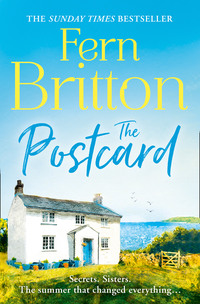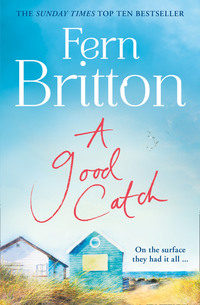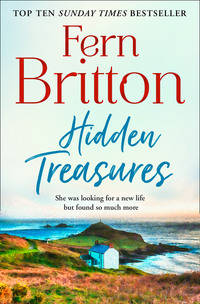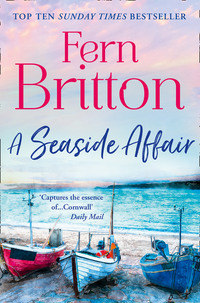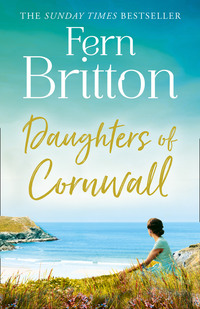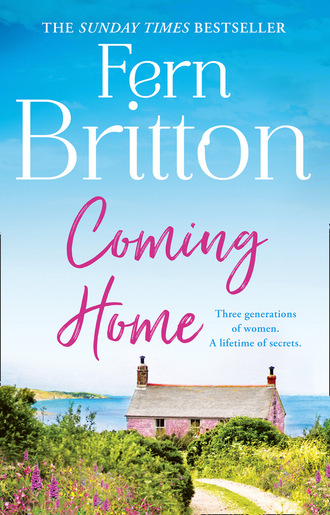
Полная версия
Coming Home
Ella was mortified and dug Henry in the ribs. ‘Shut up.’
‘Just saying,’ he said, clutching his side. ‘Will the pasties keep for an hour?’
‘Yes. Go on. They’ll keep. I’ll take your bag up to your room. You’re in Kit’s studio. For now.’
‘I’ll take it up later. It’s heavy.’ He opened it and hauled a bulging carrier bag out. ‘Here, take this bag – it’s got a huge pile of post for you. When you left me in London I didn’t think you’d be falling in love and not coming back.’
Ella couldn’t keep a blush from her cheeks. ‘God, you are so embarrassing.’
Kit saved her. ‘Neither of us expected to fall in love, but we did. I love your sister very much.’
Henry half closed his eyes and weighed up this open declaration. ‘Good on you. Don’t muck her about or I’ll flatten you.’
‘Fair enough.’ Kit smiled. ‘Now, how about that pint? Ella, do you want to come?”
‘No thanks. You two go and get to know each other. I’ll make myself a Pimm’s and have a look through the post Henry’s brought.’
She waved the boys off with their promise to be only an hour, or so, and took the Waitrose bag of post to the garden.
Getting a glass of Pimm’s, she settled herself at the garden table and sifted through the mail.
The piles in front of her grew tediously. Catalogues. Charity requests. Bank statements. A postcard from an old school friend now living in Peru. Pension firms. Insurance firms. Funeral savings plan. And, a letter from a publisher. Months before she had written and illustrated a children’s book called Hedgerow Adventures. She had hoped that her departed granny would guide her to a fruitful contract. She opened the envelope.
Dear Miss Tallon,
Re Hedgerow Adventures
Thank you for your submission. Unfortunately this is not the sort of book we would publish. We will return the manuscript under separate cover,
Yours etc …
She sat back and blew out a long breath of frustration.
‘Granny,’ she said, ‘you got me excited for a moment. Ah well. C’est la vie.’ She picked up her Pimm’s and took a long, cool, self-commiserating mouthful.
Her phone buzzed. It was Henry.
‘Hi, Henry, is everything okay?’
‘Have you looked at your emails?’
‘No, I’ve been going through the post. So much crap …’
‘Check them now,’ he said urgently.
‘Okay, hang on.’ She put her phone on speaker and looked at the screen. There was an email waiting to be opened. ‘I’ve got it. It’s from Granny’s solicitor.’
‘Open it.’
She did so and as she read it her heartbeat began to accelerate ‘Oh. My. God,’ she whispered. ‘It can’t be true.’
‘It is true.’ Henry’s voice was gruff with anger.
Ella’s hand was shaking as she gripped the phone. Swallowing hard to stop any tears she said, ‘Our mother is alive?’
‘Yes,’ said Henry. ‘And she wants to see us.’ He was having difficulty keeping the shock from his voice. As soon as he had read the message, relaxing with a pint on the Dolphin’s oak bar and chatting to Kit, he’d excused himself and gone to the relative privacy of the pub car park to phone Ella.
He was scuffing the gravel with his shoes. ‘I can’t believe she’s got the nerve.’ He bit his lip, his face the definition of rage and pain. ‘After all these years.’ He pushed his free hand into his floppy fringe and pulled his hair. ‘She’s bloody alive. Well, I can tell you now, we are not seeing her.’
Ella sat down. ‘But she’s our mother.’
‘Ha! She lost the right to call herself that years ago.’
‘Henry, this is shock talking, we need time to think about it.’
‘No, we don’t. There’s only one reason she’d come back. Because Granny’s solicitor has told her that Granny is dead and that she is in for an inheritance. That’s all there is to it.’
Ella loved her brother very much, but she didn’t always agree with him. ‘It must have been a shock for her to hear that. Her mother dead, her father too.’
Henry snorted and ran his hands through his floppy blond hair. ‘Well, it was a bit of a shock for me too, you know, when I heard that my mum had run away. I was only two.’
‘I know.’ Ella looked at the garden she and Kit had started to plant. ‘I can’t imagine how she could leave you. She knew you. It was easier for me. I was just a baby. She didn’t have time to know me. I don’t have a clue what she was like … and that’s why I’d like to see her.’
Henry sat on the wall of the pub’s entrance, all the adrenalin leaving him. ‘I don’t know what to think. I was hoping they wouldn’t find her. Or if they did, that she had died.’
‘Don’t say that!’ Ella flopped into her squashy sofa. ‘Is Kit still with you?’
‘He’s inside. I saw the email and came out to tell you first. He doesn’t know.’
‘Come home. The pair of you. Come home now.’
Ella had been hugging herself with joy just ten minutes ago. How quickly everything can change for the worse.
Ella took Henry’s bag up to Kit’s small studio and put it next to the single bed. It was getting on for late afternoon and through the open window a blackbird was singing in the magnolia tree. Instantly anger rose in her. How dare the bloody birds be so happy while her world was turned upside down? She shut the window with a bang, making the bird fly off. Good riddance, she thought to herself.
Downstairs she heard Kit’s car pull up. She ran down and opened the front door.
Kit was looking serious, as if there had been a terrible accident and he now had the responsibility of the fallout. Which he had, she supposed.
Henry was pale and blowing out his cheeks in a childhood mannerism that always signalled upset.
‘Hi,’ she said softly.
Kit came to her immediately and put his arms around her. He felt the softness and sweetness of her incredible red curls then stood arm’s length from her, his hands on her shoulders. ‘You okay?’
She shook her head and at last felt hot tears springing to her eyes. ‘Not really.’
Kit shepherded brother and sister into the kitchen and made them sit down. ‘You both need a drink. Tea or alcohol?’
Ella settled for a cup of tea while Henry and Kit had large gin and tonics.
‘Right,’ said Kit, pulling out a chair from the table and sitting down. ‘Tell me exactly what has happened.’
Ella looked at Henry. ‘Do you want to tell him?’ she asked.
Henry shrugged in reply and looked at his hands clenching the icy glass.
She looked at Kit. ‘The solicitor has found our mother and she wants to see us.’
Kit was looking at her attentively. ‘What do you think she wants after all this time?’
‘Granny’s money,’ said Henry, flatly.
‘Or,’ said Kit trying to sound positive, ‘she might be coming because she wants to see you two, after all she hasn’t seen you for …’
‘Almost twenty-five years.’ Henry picked up his glass and drank.
Ella swallowed hard. ‘The thing is, Henry has memories of her. Nice ones, I think.’
Henry grunted.
‘They had had time to get to know each other. It was much more painful for him.’ She looked at her brother. ‘I should think.’
Henry said nothing but looked at the floor.
‘Whereas I don’t remember anything about her. I mean she left when I was only just over a year old,’ said Ella, still watching Henry. ‘That’s why I want to see her.’
Henry glared at her. ‘Really?’
Ella twiddled her fingers anxiously. ‘I want to know what she looks like. Do we look alike? What she’s been doing? Why did she leave us?’ She wiped her nose as a tear ran down her cheek. ‘Everything, really.’
Henry was angry. ‘She’s one selfish cow who doesn’t deserve to be listened to. I wouldn’t be surprised if she’s lied through her teeth anyway. She might not even be our mother. Just some strange woman who thinks she could get lucky. I wouldn’t believe a word she said.’
‘But, Henry, we must try. Then decide whether we want to be friends or not.’
‘Friends? What are you talking about? She’s a madwoman. We don’t know anything about her. Correction, we know that she had two children by the time she was seventeen and she never told her own parents who the father – or fathers – were, and despite Granny and Grandad being kind and supportive to her, she ran away in the night and never looked back. What kind of person does that?’
‘A sad person?’ Ella said quietly. ‘A person who finds themselves in a really hard place at the start of their adult life and can’t cope. People run away all the time. Every day. She was not in her right mind.’
‘Why didn’t she come back?’ demanded Henry.
‘She was scared,’ Ella said. ‘Once you’ve done something like that, maybe there is no coming back.’
Henry gave a short laugh. ‘Really? Not to have any curiosity about how your children turned out? Not even to see your own parents? Who, in case you had forgotten, never recovered from the worry of what might have happened to her?’
Ella drained her cup of tea, gripped by a sudden anger at his unkindness. She scraped her chair back and took her cup to the sink. She kept her back to her brother. ‘Have you no empathy?’ There was a tea bag in the sink. She fished it out and put it into the food bin. ‘She was just a young girl, Henry. One who had got herself in a mess and she wanted to change that.’
‘By walking out and leaving her shit to be cleared up by her parents?’ sneered Henry. ‘Brilliant.’
Kit, who had been listening to all this quietly, now intervened. ‘You two getting angry with each other isn’t going to help.’
‘Oh, shut up. You know nothing about it,’ said Henry, waving his hand dismissively.
‘I know Ella,’ Kit replied calmly, ‘and I agree with her. You both need to meet this woman and find out who she really is. If you don’t like her after that, then fine. It’s over. You can all move on.’
Ella softened and, walking to Henry’s chair, put her arms around his neck and hugged him. ‘Kit’s right.’
Henry clasped his sister’s hands and pulled her closer to him. ‘It hurts …’ He spoke quietly.
‘I know,’ she said.
‘Was it me?’ His voice caught. ‘Was it my fault?’
Ella took her arms from his neck and knelt by his side. ‘How could it be your fault. You were only two. It might have been my fault. I was the final straw. A second mistake.’
Henry’s tears began to fall. He angrily wiped them away. ‘I hate her, Ellie. I don’t want to see her and I don’t want you to see her either.’ He took her upturned face in his hands. ‘Promise me you won’t see her? I couldn’t bear it.’
Ella saw the pain in her brother’s eyes and made her decision. ‘I promise I won’t see her for as long as you don’t want me too. But I can’t promise that I’ll never want to see her.’
He nodded and let his hands drop. ‘Thank you,’ he answered simply.
2

Agra, India, 2018
Sennen was nervous. More than nervous. What was going on in Cornwall? Her solicitor had promised to phone as soon as he had heard back from Ella and Henry and she’d been restless all morning. She walked to the shuttered windows of her hotel room and looked down on to the bustle of the street market. She could almost feel the heat and smell the dust through the glass. It was monsoon season, and although the clouds had now cleared, the last downpour had left deep puddles on the muddy street and in the awnings of the market stalls. She watched as a young woman in a rose-pink sari stepped out into the busy road and neatly sidestepped a couple of hungry dogs who took a sniff at her shopping, a plastic bag filled with colourful vegetables and herbs. A passing tuk-tuk beeped his horn and she waved at the driver in recognition, rows of golden bangles slipping up her arm and glinting in the hot sun.
Sennen watched as the woman continued her journey until she was no longer in view. How jealous she was of that woman.
She began pacing her hotel room once again.
What had she done?. She twisted her wedding ring and stared at the phone by the bed, willing it to ring.
The letter that had started this turmoil was next to the phone.
A letter postmarked ‘Cornwall’.
Cornwall. She’d walked away a long time ago. She thought of a quote from The Go-Between: ‘The past is a foreign country; they do things differently there.’ Who wrote that? If Kafir were here he would know. Kafir … one of the most erudite men she knew. Not that she knew many men. Her life hadn’t all been roses, and right now it was just the thorns.
She sat on the bed, closed her eyes and began her private ritual of summoning Trevay in her mind’s eye and walking its narrow streets and lanes. What were the little boats in the harbour doing now? Would any of the ones she remembered still be working or were they left in the silt, their hulks rotting down to skeletons? Or perhaps they’d been dragged up to The Sheds where all boats rested, used and unused.
She could smell the seaweed and the salt.
Hear the gulls laughing.
The splash of water as children launched their crab lines into the deep harbour.
Her mother painting at her easel on the beach. Her washed-out linen shirts and faded trousers glowing in the sun.
Poppa sitting at his pottery wheel. The shiny slip of water and clay covering his hands to his elbows.
She dared, for a moment, to think about Henry but, as always, the electric nerve pain of the thought stopped her. She couldn’t even summon his face now. Or Ella’s. She had been a wicked woman. And now, with the letter from Cornwall, they had found her and would make her pay.
It had come like a ghost summoning her to her grave.
There were several old addresses written on the envelope as it had chased her around the globe, before finding her here, in India.
When she had read it, locked in her bathroom, away from any inquisition, the sense of fear had almost compelled her to run again.
The letter told her that her father had died some years ago, her mother three years ago. They had died intestate, had made no will, so she was the sole heir to the estate. The house had been sold for a good price when the solicitor, acting as trustee, had rightly thought the market was at its highest. That money was now in a high interest account and it was hers. She or her solicitor should come to Cornwall. All that needed to be done was to prove her identity and sign some forms. She didn’t even have to come to Cornwall, she could send a solicitor as her representative.
There was nothing about her children.
It took several days before she could formulate her reply. In it she expressed a desire to meet Henry and Ella and would only return to Cornwall if they wanted to see her.
The solicitor agreed to phone her when he had their answer.
She lay on the bed and allowed memories of her childhood to fill her thoughts.
She was on the beach at Shellsand Bay. Her father, nut-brown and strongly muscled, was swinging her round and round. He was smiling. His bright blue eyes twinkling in his tanned face and his deep laugh making her giggle. ‘Daddeeeee.’
‘Bill, darling, she might be sick,’ said her mother.
‘Are you going to be sick?’ he asked Sennen.
‘Noooooo,’ she giggled.
‘Would you like to come swimming with me and Mum?’
‘Yeeessssss.’
He put her down on the warm sand. ‘Get your rubber ring and we’ll look for the mermaids, shall we?’
Sennen ran to her mother. ‘Mummy, Daddy’s taking us swimming.’ She’d pulled at the slender, elegant hand of her mother. ‘Come on.’
Her father stood ready in his dark-blue swimming shorts.
Her mother smiled, ‘Of course. Let me just sort myself out.’ Adela had been painting in the small sketchbook she always carried with her, capturing the likeness of fishermen mending their nets or lobster pots piled high on the harbour or the holidaymakers napping in the sun.
‘I like that,’ said Bill peering over her shoulder at her watercolour of the beach scene in front of them. ‘Good colours.’
Adela stood up and put her hands on her husband’s bare chest. She kissed him. ‘Thank you.’
He kissed her back then held her slim body in his arms. She pressed her cheek against him and smelt the warmth of his skin.
‘I do love you,’ she said.
‘And I love you.’
Sennen bashed her mother on the back of the knees with her sand spade. ‘Come! On!’
Bill and Adela laughed and, taking Sennen in a hand each, they ran to the waves, swinging her between them. She had grown up surrounded by so much love and kindness. How could she have turned her back on them?
3

Cornwall, 1972
Adela was Cornish to the heart. Her parents had been wealthy landowners from Bodmin, her father the quintessential country squire and her mother a beauty of her day. Adela had wanted for nothing. The only awkward thing being that they were none of the things she actually wanted. Money, comfort, beauty, beaus – all were hers for the taking. But it wasn’t what she longed for. She dreamt of being a great artist, living a rackety bohemian life in London, preferably Pimlico, which she had heard about and liked the sound of.
When she finally told them, it had caused much consternation for her parents, who had planned a husband, Anthony, handsome and untroubled by intellect with a rather lovely medieval manor house on the banks of the Tamar.
But it was not to be. At the age of eighteen she won a place at the Slade School of Art on Gower Street, Bloomsbury.
She refused her parents’ offer of a nice little flat in Baker Street and, instead, put her name down for a flat-share with any of the new, female, students she would be joining up with. She would find out who when she arrived for her first term.
Her mother, a woman with a great capacity for organisation, decided her talents would be best spent taking her only child to Truro for the day and kitting her out with a new wardrobe of fashionable dresses and accessories and, as an afterthought, paints.
Come early September her father ordered his cherished Morris 6 to be serviced, polished and refuelled and drove her up to London in what he noted was record time. Nine and a half hours. It would have been even quicker if it hadn’t been for the thick fog that had rolled over Dartmoor and a puncture on the A38.
Adela had waved him off to his club, where he would spend the night before the return journey the following day, and set about her new life with enthusiasm.
Her new flat, off Marylebone High Street, was small but clean and her flatmates were fun. There was Elsie, who was Irish and smoked, and Kina, who tied her hair with bright cotton scarves and wore boy’s jeans. She was from Jamaica and was the most exotic person Adela had ever met.
Together they shared everything, including Kina’s fashion sense. Within days Adela’s pretty dresses and gloves, were taken off their hangers and bundled into Adela’s suitcase under her single bed. Now Adela hunted the jumble sales and bric-a-brac stalls for overgrown jumpers and men’s shirts which she knotted at the waist and loose canvas trousers. For a brief moment she tried smoking too but she really couldn’t get on with it so took, instead, to drinking halves of bitter when she met fellow students in the pub.
The first year flew by and, returning to Cornwall the following summer, she was surprised by how much she had missed it.
Her mother wanted to know all the London gossip. She had none. Had she been to Harrods? No. At which restaurants had she dined? Again, none.
Had she met any nice boys as she would be delighted to invite them to tea? No, but if I do I shall let them know.
Why did she wear such shabby clothes? I like them.
Wouldn’t she like to get her hair styled? It’s fine as it is.
It was towards the end of August that Adela took herself up to the golden fields of swaying corn in order to paint the local men who were getting her father’s harvest in.
Her mother had hung string bags of bread, cheese and pasties on her handlebars and in her panniers she had placed bottles of cider to give the men a snack. When Adela had arrived, the men, stripped to their vests, had cheered and stopped work to enjoy their break. She knew most of them by sight, if not by name, as they had been getting the harvest in for as many years as she could remember.
Perching on whatever they could find, the bolder amongst them asked about her new life in London. She told them about the London pubs she visited and the life-drawing classes where the models were naked.
There was one boy, wide-shouldered and sunburnt with very blue eyes and very white teeth who lay on his shirt and listened but didn’t look at her or join in.
She had never seen him before.
When the snack was done and both thirsts and appetites quenched, Old John, her father’s stockman, called the men back to their labours.
The new boy thanked her for the food and drink and introduced himself as Bill. His hand was rough and strong in hers as she shook it. ‘Will you be here tomorrow?’ he had asked. ‘I’m not sure,’ she replied.
He smiled as he put his cap on and picked up his pitch fork. ‘Nice to meet you,’ he said and strode back up the field.
‘Who’s that new boy helping with the harvest?’ she asked her father over dinner that night.
‘Aha,’ smiled her father. ‘No need to ask you which one. All the girls are after him.’
Adela looked at the asparagus on her plate and stabbed it. ‘I was just wondering.’
Her father gave a sly look to her mother and said innocently, ‘He’s a good chap, actually. I know his father. Nice man but awfully worried for the boy. He doesn’t want to join the family firm. He’s down in St Ives, working with some pottery chap. Pity.’
Adela couldn’t help but bristle. ‘Pity? Because he prefers art to business?’
Her mother leant over and touched Adela’s hand. ‘No dear, your father is mischief-making. The boy – William, I think his name is?’ She looked at her husband who nodded. ‘William, is a super chap, although a bit of a leftie.’
Adela couldn’t help but laugh. ‘We are all a bit “leftie” now, you know.’
‘We are not!’ Her father banged the table.
‘Well, I am,’ said Adela calmly.
Her mother gasped and clutched her throat. ‘Oh darling, is that why you dress like a man?’
Adela shook her head smiling. ‘No, Mother, I dress like this because it’s comfortable and practical and all my friends do the same.’
Her father took a mouthful of pork pie and mumbled, ‘I told you we shouldn’t have let her go to London.’
Her mother ignored him. ‘But, Adela, dear, if you want a husband you must at least try to look pretty.’
‘I’m not sure I want a husband.’
‘But, dear …’ Her mother was putting two and two together and making six. ‘Do you not like men?’
Adela put her knife and fork neatly on her plate and said nothing.
‘I mean,’ her mother continued, ‘it could be just a phase you’re going through. I remember at boarding school there were girls who got quite friendly but they got over it in the end.’
‘Mother, stop, you are embarrassing Father, me and yourself.’
‘Your father’s a farmer, he knows all about these things.’ She turned to her husband. ‘Don’t you, dear?’
Her father finished his wine and stood up. ‘I’m going to let the dogs out.’
‘Mother, you are terrible,’ said Adela watching her father go. ‘Now let’s clear the table.’
The next day, Adela went back to the fields and was pleased when William waved at her and was one of the first to get a glass of lemonade and slice of cheese. ‘Hello again,’ he said. ‘Are you painting today?’


